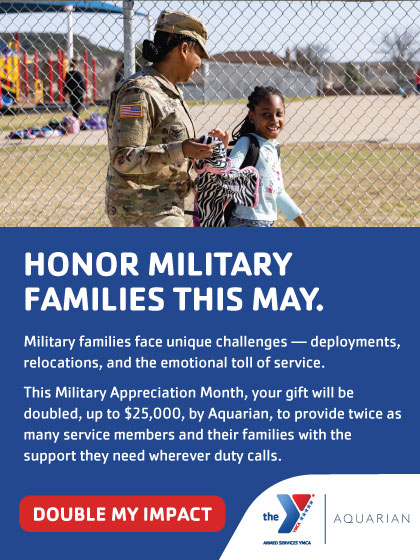The Effects of Military Life on Child Development and Mental Health
Written by Alita Miller
Children who grow up in military families have unique experiences compared to their civilian peers. They move frequently, spend extended periods of time away from their parents during deployment and training periods, and get indirect exposure to war, conflict and violence, often at a young age. So what does this mean for the military child’s development and mental health?
According to a 2018 review of nine studies1 comparing military and civilian children, military children generally adapt well to the changes and adversity they experience. Time and again, studies have found no significant differences in military children’s wellbeing compared to their civilian peers, except in one major aspect of military life: deployment.
Effects of Deployment on Military Families
Over 1 million children2 have at least one parent in active duty service. These service members are employed full-time by the military and can be deployed at any time. Most active duty service members will experience at least one deployment3, where they go abroad in service of a mission, during their careers. Deployments last an average of six to 12 months4, but they vary in length of time and type of service, and they can be in combat or non-combat situations.
No matter the type or length, deployments are a stressful time for the service member and their family back home. Family routines are disrupted and the remaining parent is left to manage the household and childcare on their own. Children may fear for the safety of the deployed parent, and younger children who can’t understand why the parent is leaving may fear that they won’t return. Depending on the type and location of the deployment, there may be significant time differences, and the service member may have limited means of communicating with their family back home, making it difficult to maintain a relationship while they’re gone.
When they do return, the reintegration process has its own difficulties. Especially with younger children, parents are often met by a child that is very different than the one they left behind and who may have little to no recollection of them. They have to rebuild their relationship from the ground up, which can be stressful for everyone involved, more so if the service member returns with physical or psychological injuries.
All of this comes at a cost to our military families. Studies5-9 have shown that children of all ages experience more emotional and behavioral problems when their parents are deployed. Younger children show behavioral problems and attachment difficulties during the deployment and the reintegration period, such as difficulty sleeping, bed wetting, nightmares, excessive clinginess, and difficulty trusting the deployed parent or respecting their authority. Older children and adolescents with a deployed parent show problems like decreasing grades, anxiety and depression, aggressive behaviors, suicidal thoughts and substance use.
These problems could be related to the absence of the deployed parent as well as the mental health of the remaining parent. Spouses of deployed service members report10 more stress and depression11, as well as increased use of mental health services and medications12. Given that military families relocate often, the stress on the remaining spouse could be higher if they’re living far from family and a support system. And since children’s wellbeing is tied to the health and wellbeing of their parents13, it’s no surprise that children would be negatively impacted by a parent’s deployment, both by the absence of one parent and the mental health toll it takes on the other.
What We Do to Help Families During Deployment
The Armed Services YMCA has been supporting our military for 160 years with free or low-cost services that strengthen military families, including youth development and educational programs, childcare, and resources to make mental health services more accessible for military parents. We understand how difficult the deployment period can be for families and is why we offer the following programs and services to help families cope.
Operation Kid Comfort provides quilts and pillows to military children of deployed active duty service men and women. Volunteers lovingly create hand-crafted, custom photo-transfer quilts and pillows to help children cope with the stress and sadness that comes with being separated from a parent during deployment.
Children’s Waiting Room is a child care program located inside military hospitals that allows parents to attend medical or mental health appointments without the stress of finding child care outside of the hospital.
Operation Hero is a free after-school program for military children in grades 2- 8, designed to help students cope and adjust to the unique challenges of military life, such as frequent moves and deployment separation.
Our military families sacrifice so much for us and our country, find out how you can support them through the Armed Services YMCA.
Donate Today
Cited Sources:
- https://capmh.biomedcentral.com/articles/10.1186/s13034-018-0252-1
- https://download.militaryonesource.mil/12038/MOS/Reports/FY2016-Report-on-DoD-Policy-and-Plans-for-MFR.pdf
- https://www.ncbi.nlm.nih.gov/books/NBK206861/#:~:text=The%20average%20number%20of%20deployments,2.1%20in%20the%20Air%20Force
- https://www.uso.org/stories/2871-how-long-is-a-military-deployment?__cf_chl_captcha_tk__=4oXhm5WOr5N0JE_91VJY6YsWJJaWXtISIoTD8JUH888-1638250667-0-gaNycGzNB_0 and https://www.ncbi.nlm.nih.gov/books/NBK206861/#:~:text=The%20average%20number%20of%20deployments,2.1%20in%20the%20Air%20Force
- https://capmh.biomedcentral.com/articles/10.1186/s13034-019-0287-y
- https://www.sciencedirect.com/science/article/pii/S0029655415001827#bib25
- https://www.ncbi.nlm.nih.gov/pmc/articles/PMC3312898/#B10
- https://jamanetwork.com/journals/jamapediatrics/article-abstract/380425
- https://www.sciencedirect.com/science/article/abs/pii/S1054139X09005989
- https://www.jstor.org/stable/41714565
- https://journals.sagepub.com/doi/10.1177/0095327X08324765
- https://www.researchgate.net/publication/224933205_Association_of_Military_Deployment_of_a_Parent_or_Spouse_and_Changes_in_Dependent_Use_of_Health_Care_Services
- https://www.degruyter.com/document/doi/10.12987/9780300133936/html


